Jingyuetan National Scenic Area
Jingyuetan, National AAAAA Class Tourist Scenic Spot, National Scenic Spot, National Forest Park, National Civilized Scenic Spot Demonstration Site, National Water Conservancy Scenic Spot, National National Outdoor Sports Base.
Jingyuetan Scenic Area is located in Chunjingyue Economic Development Zone, southeast Minister of Changchun City, Jilin Province. It is only 18 kilometers away from the People's Square in the center of the city. The area of the scenic area is 96.38 square kilometers. The area of the water area is 5.3 square kilometers, and the forest coverage rate is over 96%. Jingyuetan Lake is named for its meniscus shape. It is a sister pool with Taiwanese Riyuetan Lake. It is one of the "Eight Sceneries of Jilin" and is known as "Jingyuetan Shenxiu".
Jingyuetan Lake was the first water source for Changchun City in 1934, which was constructed artificially. It was called "water source" or "water storage pond" in the period of occupation. The name of Jingyuetan was created by Zheng Yu, the second son of Zheng Xiaoxu, Prime Minister of Manchuria and then director of the Capital Construction Bureau of Manchuria. The forests in the scenic area are constructed artificially and contain a complete forest ecological system of 30 tree species. They have unique geographical advantages, making them "a pure land in a noisy city". They have the reputation of "Asia's largest artificial forest sea", "Green Sea Pearl", "Urban Oxygen Bar". They are the ecological green core and city card of Changchun City.
Jingyuetan scenic spot is full of scenery, and the four seasons are different. The largest man-made forest in Asia is related to mountains and rivers, which forms the picture of the changing seasons of Jingyuetan Lake. Jingyuetan has become an ideal place for spring, summer, autumn and winter.
Jingyuetan is not only an eco-leisure center, but also a sports fitness center. As the main venue of Changchun Summer Festival and Changchun Ice and Snow Festival, Jingyuetan International Skiing Festival, Jingyuetan Forest Marathon, Jingyuetan Mountain Bicycle Marathon, Jingyuetan Forest Orienteering Race, Jingyuetan Dragon Boat Race and other events and activities have been carried out successively. We are committed to advocating a healthy, fashionable and leisure lifestyle and creating an international gathering place for well-known tourism and cultural activities.
Jingyuetan is located in Jingyue National High-tech Industrial Development Zone, southeast of Changchun City, Jilin Province. It is 14 kilometers from the People's Square in the city center, 16 kilometers from Changchun Station and 28 kilometers from Changchun Longjia International Airport.
Geographical coordinates are 125 degrees East 21 minutes and 43 degrees north 52 minutes.
topographic features
Jingyuetan is located in the front platform of Changbai Mountains, which belongs to the transition zone from the foot of Changbai Mountains to the western grassland. It spans three flora of Changbai Mountains, Inner Mongolia and North China, and its forest coverage is over 96%. The scenic spot is between 220 meters and 406.5 meters above sea level. The topography varies from north to south. The topography in the north is quite undulating. The topography in the south is relatively flat and open. The undulating mountains stretch into vertical and horizontal valleys, surrounded by a pool of blue water like a crescent moon.
Jingyuetan Lake is a low hilly terrain with 119 peaks and sizes. There are 86 mountains extending from north to south to the edge of the lake. It not only has ravines and mountains, but also has a bird's eye view of the lake. The whole mountain is like a python winding, of which Dajia Mountain is still the highest elevation.
Climatic characteristics
Jingyuetan Lake is located in the temperate semi-humid monsoon climate zone, with the highest temperature of 28.32 C and the lowest temperature of - 22.48 C. The average temperature in winter is about 10-18 degrees below zero. The average annual precipitation is 654.3 mm, and the depth of snow cover in winter is about 30 cm. The content of negative oxygen ion in forest is 100 times higher than that in urban area.
development history
In 1932, after acquiring the Manchurian Railway Affiliated Land in Changchun, the Japanese invading army found that the Fengshijun government at that time had a tight control over the water source in Changchun, which made the water source of the Manchurian Railway Affiliated Land very tense. After the establishment of the Puppet Manchukuo, the Puppet Manchukuo Capital Construction Bureau, assisted by the "Manchu Railway", immediately investigated the water sources in Changchun and found deep groundwater about 100 meters underground.
The hilly terrain below Xinli City and the largest river in the region is Yitong River. There are no mountains and reservoirs on both sides of the Yitong River. All the tributaries suffer from narrow and shallow conditions. Only the rivers along the Zihe River do not dry up all the year round. In 1934, after comparing water quality, water quantity and cost, the Puppet State Capital Construction Bureau finally decided to build a dam at a place called Yao Station 12 kilometers southeast of Changchun to intercept the water along the Zihe River.
In May 1934, the water storage project was started and water supply began in January 1936. The daily water supply capacity of this reservoir is 40,000 cubic meters, which exceeds the water purification capacity of Nanling Water Purification Plant by 20,000 cubic meters. The 4.6-square-kilometer reservoir was later named "Jingyuetan".
However, due to the small amount of rivers along the sub-rivers, the water supply of Puppet State Capital is urgent in five years, and only the backup water source of Huanglong Park Reservoir (intercepting three runoffs in the upper reaches of Xihegou, the tributary of Yitong River, and now Changchun Nanhu Lake) can be used. In the last two years of Puppet State Capital, the Yitong River water intercepted by Xiaobanqiao sluice of Nanling Waterworks will be used as the main water supply Source. In 1958, with the completion of Xinlicheng Reservoir, the Yitong River began to supply water to Nanling Waterworks after regulating the flow of the Reservoir, and Jingyuetan was changed to the reserve water source of Changchun City.
Honors
In 1988, Jingyuetan was approved as a national scenic spot by the State Council.
In 1989, it was approved as National Forest Park by the State Forestry Administration.
In 1995, the administrative committee of Jingyuetan Tourism Economic Development Zone in Changchun was established. Jingyuetan National Forest Park was positioned on urban forest eco-tourism, and the infrastructure construction of scenic spots was strengthened.
In April 1999, Changchun Jingyuetan Tourism Development Group Co., Ltd. was established.
In 2001, it was rated as a national 4A tourist attraction, which has passed ISO9002 national quality management system certification and ISO14001 international environmental management system certification.
On March 15, 2003, the Vasa Ski Festival in Jingyuetan was officially established in Changchun, China.
In February 2009, it was awarded the title of "National Civilized Scenic Spot" by the Central Civilization Office, the Ministry of Construction and the National Tourism Administration.
On January 14, 2011, it was officially awarded "National AAAAA Class Tourist Scenic Spot" by the National Tourism Administration.
On December 31, 2012, "Jingyuetan" was awarded as a well-known trademark in China.
In April 2012, it was awarded "the first batch of national standardized service demonstration units" by the National Tourism Administration.
In August 2012, it was awarded "National Outdoor Sports Base for National Fitness" by the State General Administration of Sports.
In 2013, the All-China Federation of Trade Unions identified it as "the vanguard of workers".
In June 2014, the Vasa International Skiing Festival in Jingyuetan officially joined the World loppet Sports Organization.
In July 2014, it was appraised as "the outstanding contribution unit of the National Sunshine Sports Congress" by the State General Administration of Sports, the Ministry of Education and the Central Committee of the Communist Youth League.
In November 2014, Jingyuetan was rated as one of the top ten excellent sports tourism scenic spots in China.
In December 2014, Jingyuetan was named a famous service enterprise in Jilin Province.
In February 2017, Jingyuetan was awarded the National Sports Industry Demonstration Unit by the State General Administration of Sports.
In July 2017, the Vasa International Skiing Festival in Jingyuetan was awarded the first batch of national sport tourism events.
In December 2017, the Vasa International Skiing Festival in Jingyuetan was awarded the top ten Chinese brand festivals in the exhibition industry in 2017.
In December 2017, the Vasa International Skiing Festival in Jingyuetan was awarded the top ten most influential ice and snow tourism festivals in China.
Myths and legends
Legend has it that one year, the seven daughters of the Queen Mother went to the world to play. Her seventh daughter, the Seven Fairies, saw a young man carrying a broken umbrella and wiping tears as she walked. She became a village maid and they loved to live together at first sight. The Queen Mother was very angry when she learned about this. She decided to send Tianbing Tianjun to capture the seven fairies. On that day, the sky suddenly overcast, and a strong wind blew the seven fairies into the sky. Looking at the hut where she and her lover lived, the seven fairies could not help falling two lines of tears, one drop in the south, into Taiwan's Sun Moon Lake, one drop in the north, into Changchun's Jingyue Lake.
Opening Hours
Opening hours of scenic spots: 6:00-21:00. Open to the outside world all year round and sell tickets all day.
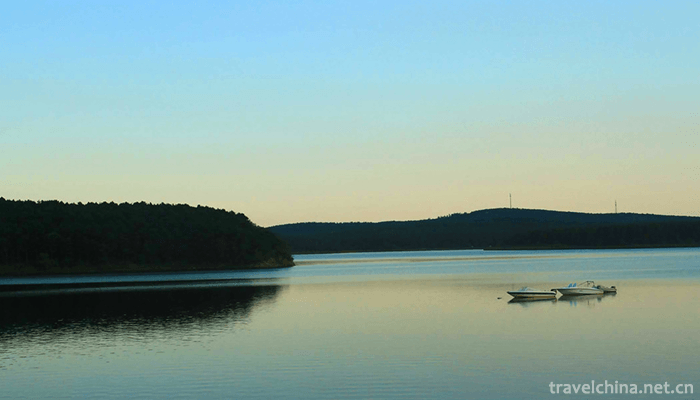
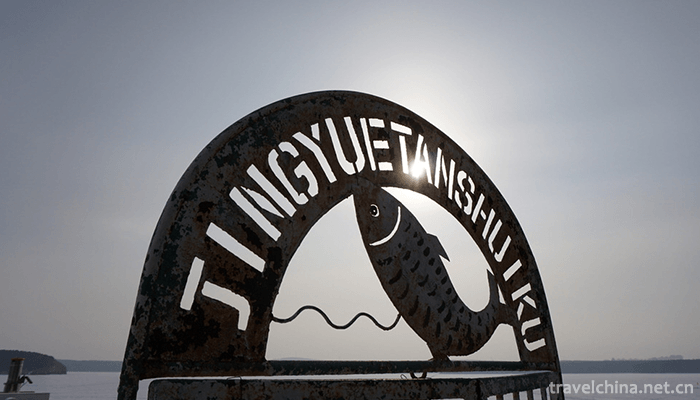
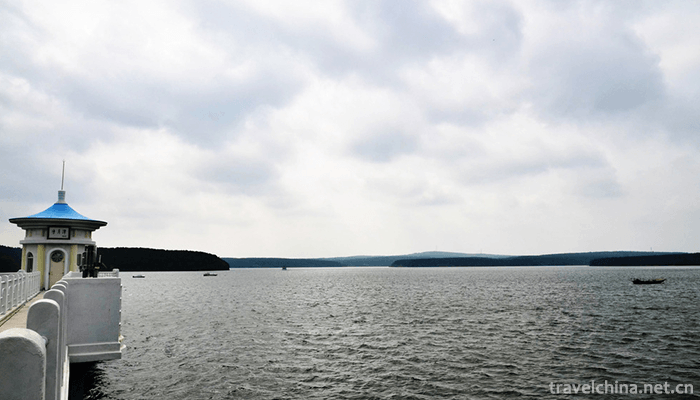
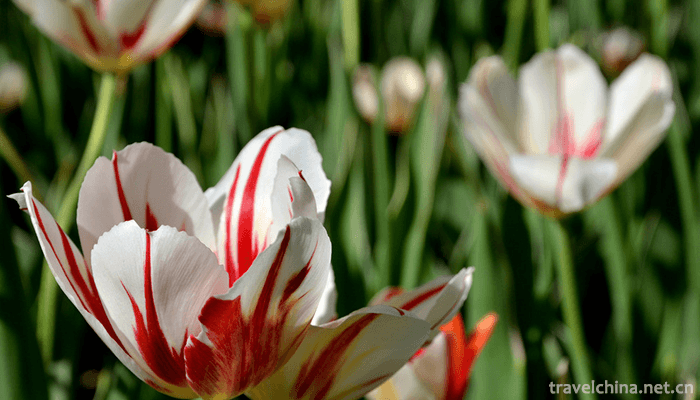
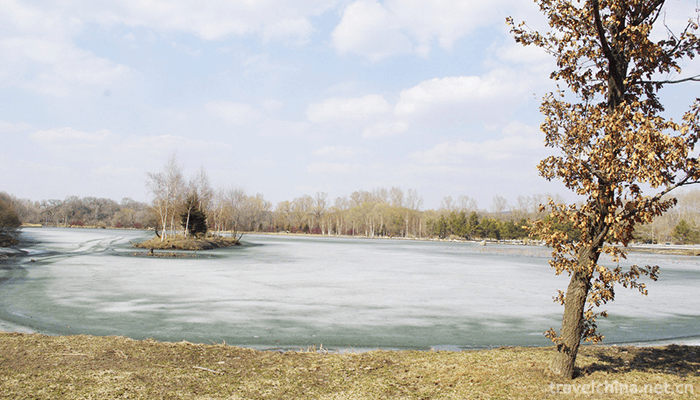
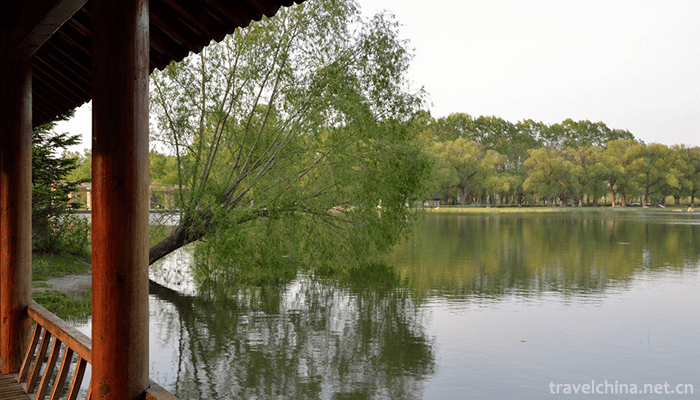
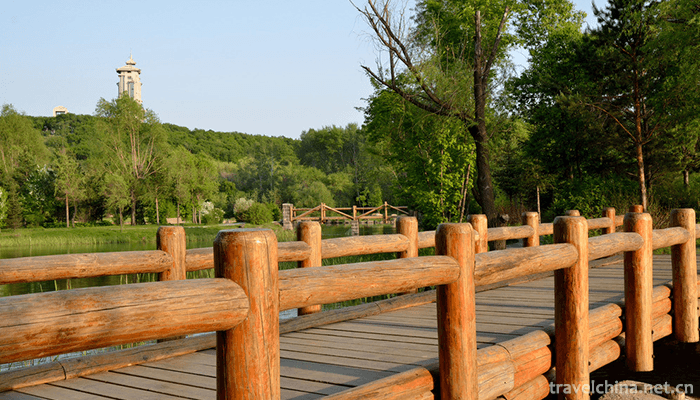
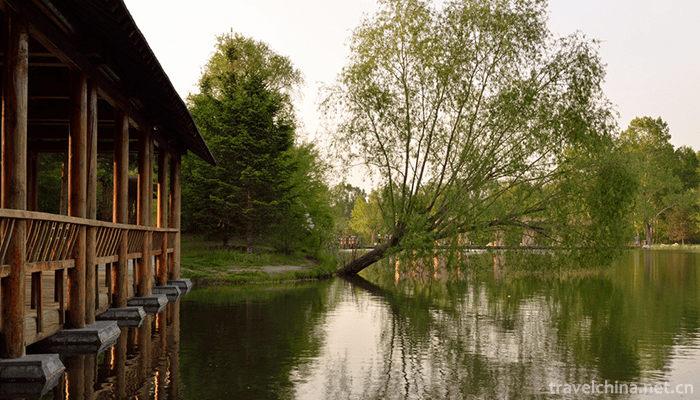
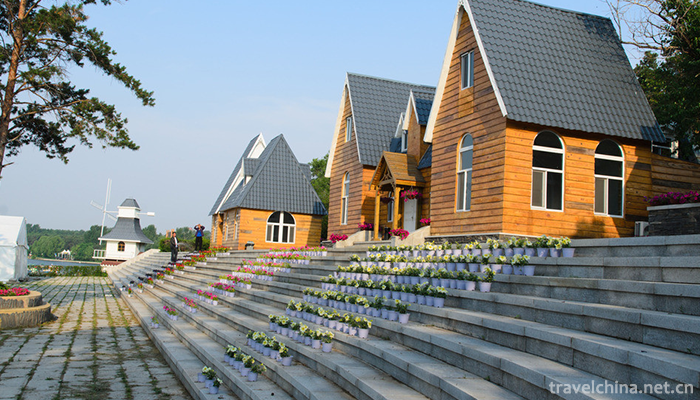
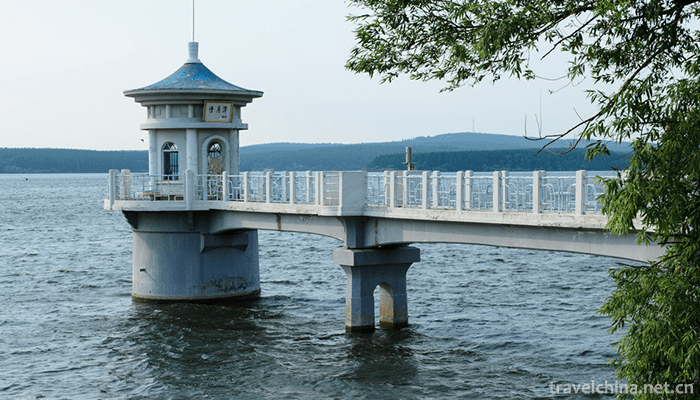
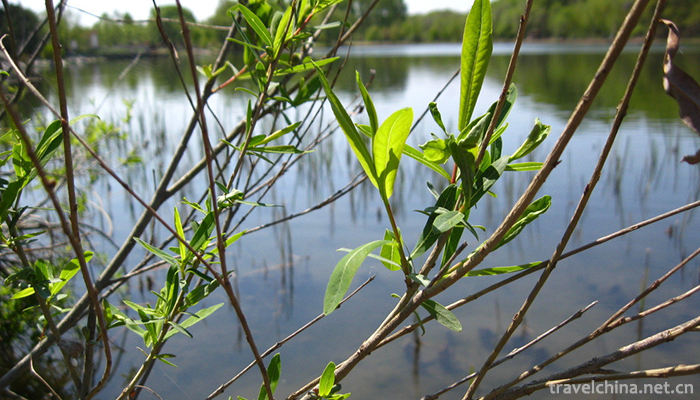
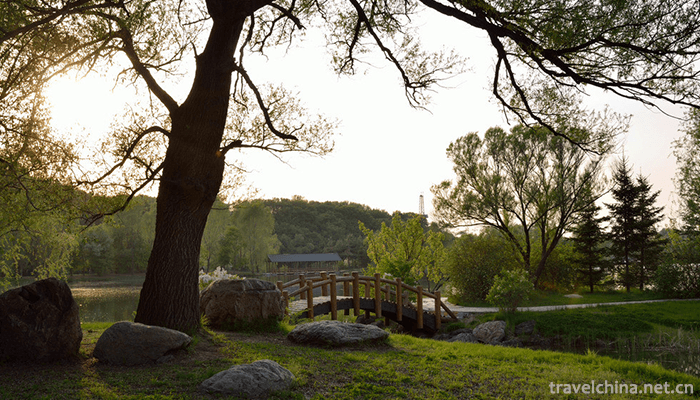
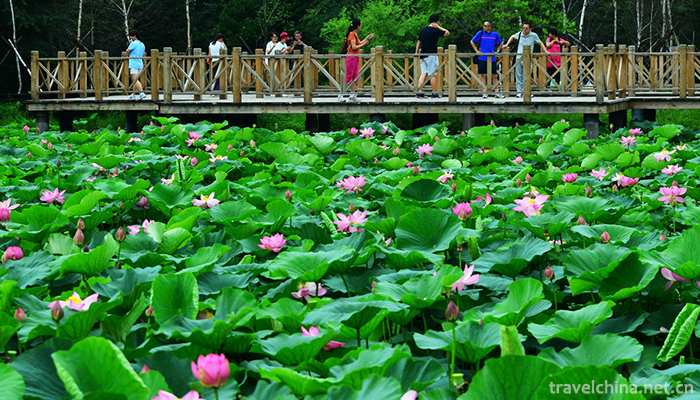
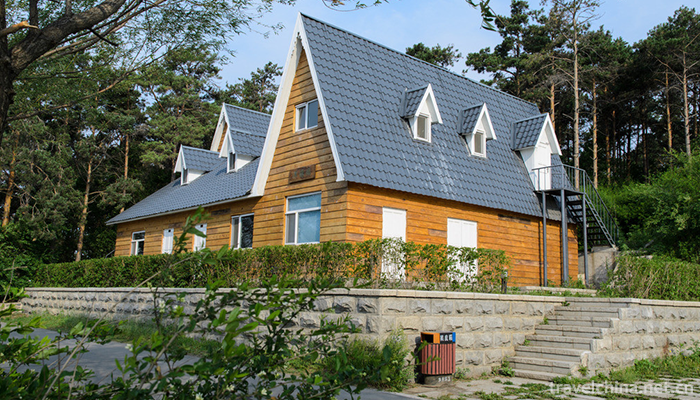
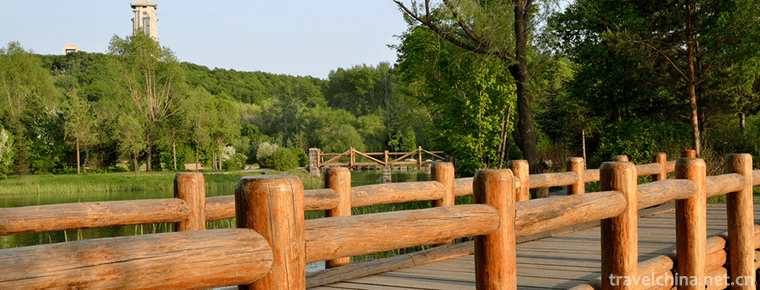
-
1.Dazhao Temple Scenic Area in Lhasa
Dazhao Temple, also known as "Zula Kang" and "Jue Kang" (Tibetan meaning for Buddhist temple), is located in the center of the old city of Lhasa. It is a Tibetan Buddhist temple bu
Time 2018-12-12 -
2.Dajiaowan Scenic Area Hailing Island Yangjiang
Dajiaowan Scenic Spot of Hailing Island in Yangjiang, located in Zhapo Town of Hailing Island in Yangjiang City, Guangdong Province, is a famous national AAAAA tourist attraction
Time 2018-12-12 -
3.Zhenbeibao West Film City
Zhenbeibao Western Film City, located in Yinchuan City, Ningxia Hui Autonomous Region, is a national AAAAA-level tourist attraction integrating sightseeing, entertainment, leisure, catering and shoppi
Time 2018-12-12 -
4.Yellow River First BeachTime 2018-12-22
-
5.De rong xue qiang
Derong Xueqiang is a folk dance popular in Waka Township, Derong County, Ganzi Prefecture. Its movements are strong, simple and generous, its next steps are strong and its feet are crisp
Time 2019-04-26 -
6.Qiyang minor
Qiyang in the north of Yongzhou is a kind of traditional opera widely spread. After a long period of evolution and development, it has formed a traditional folk art form with strong local color,
Time 2019-06-10 -
7.Taishan Stone Dang Custom
Taishan Stone Dangdang Custom is a relic of ancient people's worship of spiritual stones. Mountain and stone are regarded as personality by myth, which is a typical traditional folk culture that has b
Time 2019-06-18 -
8.Xujiaquan
Xujiaquan, a traditional boxing method, originated in Tongji Village, Xintai City, Shandong Province. Xujiaquan originated in Yongzheng Period of Qing Dynasty and was created by Xu Shengcai, Gaozu of
Time 2019-07-09 -
9.Xihua University
Xihua University, located in Chengdu City, Sichuan Province, is a provincial key comprehensive university with complete disciplines and multi-disciplinary development. It has been selected as "Ba
Time 2019-08-31 -
10.Cai Lun
Cai Lun(?-121 years ) Zhong Zhong, a member of Guiyang County in Eastern Han Dynasty. Emperor Ming of Han Yongping entered the palace in the end, Zhang and two years (AD 88). Cai Lun was promoted to t
Time 2019-09-06 -
11.West Anhui University
West Anhui University (West Anhui University) was the 3 menstrual period of 2000. Ministry of Education Approved provincial comprehensive Undergraduate Colleges From the original West Anhui United Uni
Time 2019-11-20 -
12.Recommended routes for Chengdu Giant Panda Base
Recommended routes for Chengdu Giant Panda Base,Recommended route (1.5 hour tour)
Time 2020-12-13